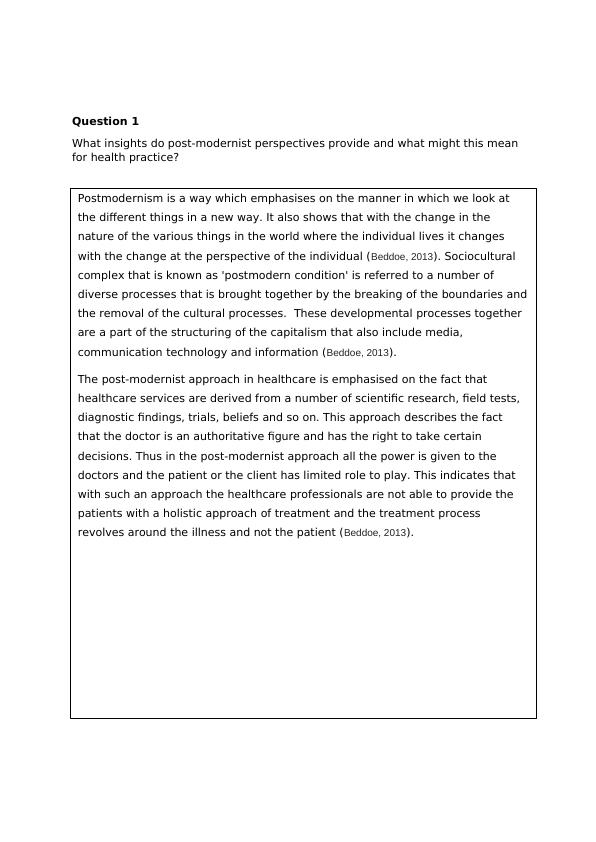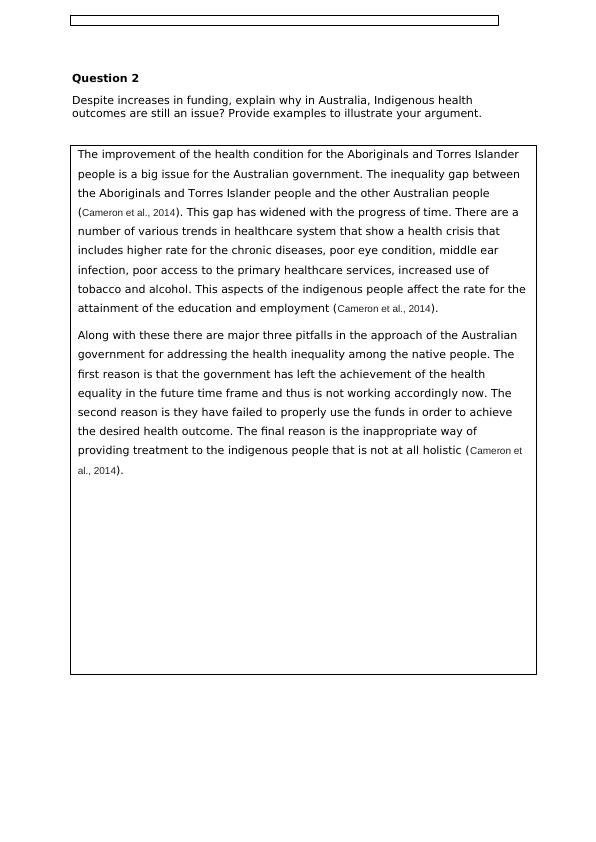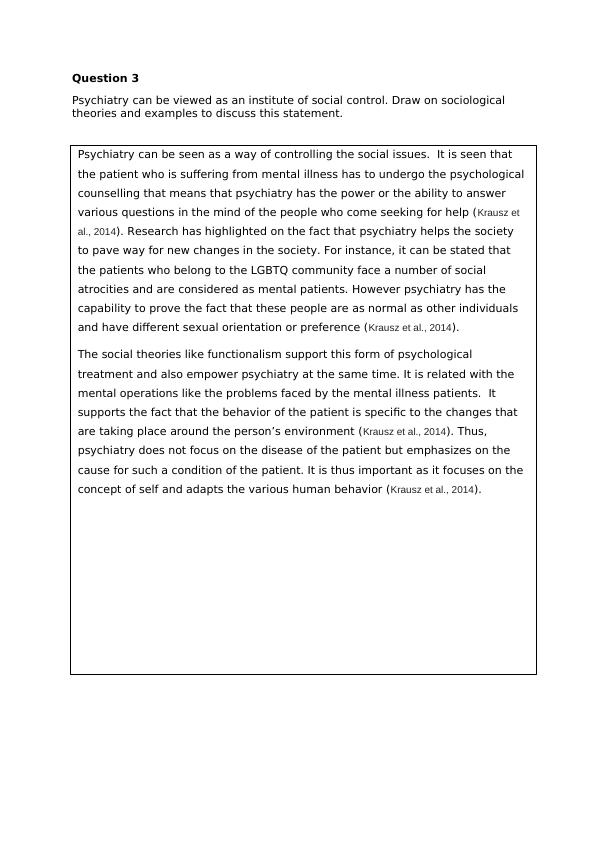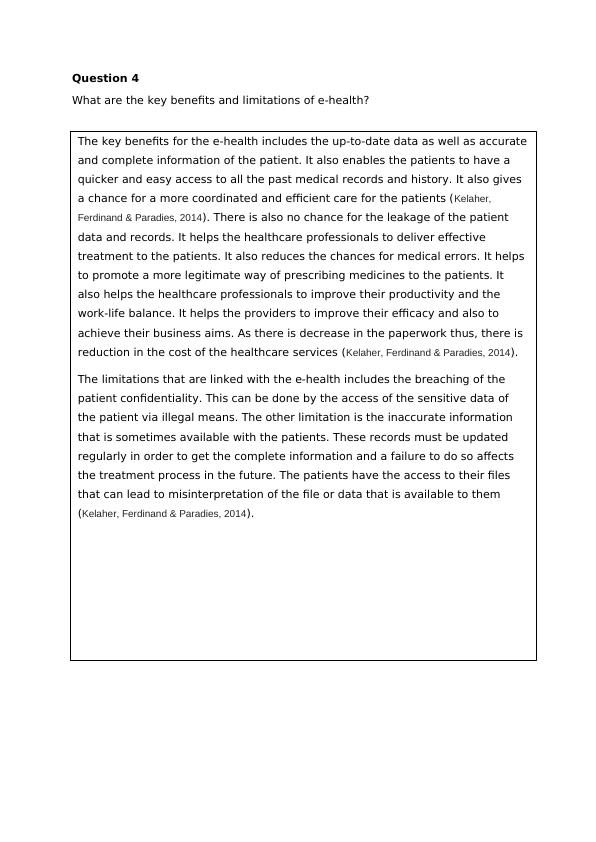Postmodernist Perspectives in Healthcare: Implications for Practice
Answer 10 short questions on various topics related to health and sociology.
11 Pages6276 Words151 Views
Added on 2022-11-16
About This Document
This article discusses the postmodernist approach in healthcare and its implications for practice. It highlights the limitations of the approach and the need for a more holistic approach to treatment. The article also discusses the sociocultural complex known as the 'postmodern condition' and its impact on healthcare.
Postmodernist Perspectives in Healthcare: Implications for Practice
Answer 10 short questions on various topics related to health and sociology.
Added on 2022-11-16
ShareRelated Documents
Question 1
What insights do post-modernist perspectives provide and what might this mean
for health practice?
Postmodernism is a way which emphasises on the manner in which we look at
the different things in a new way. It also shows that with the change in the
nature of the various things in the world where the individual lives it changes
with the change at the perspective of the individual (Beddoe, 2013). Sociocultural
complex that is known as 'postmodern condition' is referred to a number of
diverse processes that is brought together by the breaking of the boundaries and
the removal of the cultural processes. These developmental processes together
are a part of the structuring of the capitalism that also include media,
communication technology and information (Beddoe, 2013).
The post-modernist approach in healthcare is emphasised on the fact that
healthcare services are derived from a number of scientific research, field tests,
diagnostic findings, trials, beliefs and so on. This approach describes the fact
that the doctor is an authoritative figure and has the right to take certain
decisions. Thus in the post-modernist approach all the power is given to the
doctors and the patient or the client has limited role to play. This indicates that
with such an approach the healthcare professionals are not able to provide the
patients with a holistic approach of treatment and the treatment process
revolves around the illness and not the patient (Beddoe, 2013).
What insights do post-modernist perspectives provide and what might this mean
for health practice?
Postmodernism is a way which emphasises on the manner in which we look at
the different things in a new way. It also shows that with the change in the
nature of the various things in the world where the individual lives it changes
with the change at the perspective of the individual (Beddoe, 2013). Sociocultural
complex that is known as 'postmodern condition' is referred to a number of
diverse processes that is brought together by the breaking of the boundaries and
the removal of the cultural processes. These developmental processes together
are a part of the structuring of the capitalism that also include media,
communication technology and information (Beddoe, 2013).
The post-modernist approach in healthcare is emphasised on the fact that
healthcare services are derived from a number of scientific research, field tests,
diagnostic findings, trials, beliefs and so on. This approach describes the fact
that the doctor is an authoritative figure and has the right to take certain
decisions. Thus in the post-modernist approach all the power is given to the
doctors and the patient or the client has limited role to play. This indicates that
with such an approach the healthcare professionals are not able to provide the
patients with a holistic approach of treatment and the treatment process
revolves around the illness and not the patient (Beddoe, 2013).

Question 2
Despite increases in funding, explain why in Australia, Indigenous health
outcomes are still an issue? Provide examples to illustrate your argument.
The improvement of the health condition for the Aboriginals and Torres Islander
people is a big issue for the Australian government. The inequality gap between
the Aboriginals and Torres Islander people and the other Australian people
(Cameron et al., 2014). This gap has widened with the progress of time. There are a
number of various trends in healthcare system that show a health crisis that
includes higher rate for the chronic diseases, poor eye condition, middle ear
infection, poor access to the primary healthcare services, increased use of
tobacco and alcohol. This aspects of the indigenous people affect the rate for the
attainment of the education and employment (Cameron et al., 2014).
Along with these there are major three pitfalls in the approach of the Australian
government for addressing the health inequality among the native people. The
first reason is that the government has left the achievement of the health
equality in the future time frame and thus is not working accordingly now. The
second reason is they have failed to properly use the funds in order to achieve
the desired health outcome. The final reason is the inappropriate way of
providing treatment to the indigenous people that is not at all holistic (Cameron et
al., 2014).
Despite increases in funding, explain why in Australia, Indigenous health
outcomes are still an issue? Provide examples to illustrate your argument.
The improvement of the health condition for the Aboriginals and Torres Islander
people is a big issue for the Australian government. The inequality gap between
the Aboriginals and Torres Islander people and the other Australian people
(Cameron et al., 2014). This gap has widened with the progress of time. There are a
number of various trends in healthcare system that show a health crisis that
includes higher rate for the chronic diseases, poor eye condition, middle ear
infection, poor access to the primary healthcare services, increased use of
tobacco and alcohol. This aspects of the indigenous people affect the rate for the
attainment of the education and employment (Cameron et al., 2014).
Along with these there are major three pitfalls in the approach of the Australian
government for addressing the health inequality among the native people. The
first reason is that the government has left the achievement of the health
equality in the future time frame and thus is not working accordingly now. The
second reason is they have failed to properly use the funds in order to achieve
the desired health outcome. The final reason is the inappropriate way of
providing treatment to the indigenous people that is not at all holistic (Cameron et
al., 2014).

Question 3
Psychiatry can be viewed as an institute of social control. Draw on sociological
theories and examples to discuss this statement.
Psychiatry can be seen as a way of controlling the social issues. It is seen that
the patient who is suffering from mental illness has to undergo the psychological
counselling that means that psychiatry has the power or the ability to answer
various questions in the mind of the people who come seeking for help (Krausz et
al., 2014). Research has highlighted on the fact that psychiatry helps the society
to pave way for new changes in the society. For instance, it can be stated that
the patients who belong to the LGBTQ community face a number of social
atrocities and are considered as mental patients. However psychiatry has the
capability to prove the fact that these people are as normal as other individuals
and have different sexual orientation or preference (Krausz et al., 2014).
The social theories like functionalism support this form of psychological
treatment and also empower psychiatry at the same time. It is related with the
mental operations like the problems faced by the mental illness patients. It
supports the fact that the behavior of the patient is specific to the changes that
are taking place around the person’s environment (Krausz et al., 2014). Thus,
psychiatry does not focus on the disease of the patient but emphasizes on the
cause for such a condition of the patient. It is thus important as it focuses on the
concept of self and adapts the various human behavior (Krausz et al., 2014).
Psychiatry can be viewed as an institute of social control. Draw on sociological
theories and examples to discuss this statement.
Psychiatry can be seen as a way of controlling the social issues. It is seen that
the patient who is suffering from mental illness has to undergo the psychological
counselling that means that psychiatry has the power or the ability to answer
various questions in the mind of the people who come seeking for help (Krausz et
al., 2014). Research has highlighted on the fact that psychiatry helps the society
to pave way for new changes in the society. For instance, it can be stated that
the patients who belong to the LGBTQ community face a number of social
atrocities and are considered as mental patients. However psychiatry has the
capability to prove the fact that these people are as normal as other individuals
and have different sexual orientation or preference (Krausz et al., 2014).
The social theories like functionalism support this form of psychological
treatment and also empower psychiatry at the same time. It is related with the
mental operations like the problems faced by the mental illness patients. It
supports the fact that the behavior of the patient is specific to the changes that
are taking place around the person’s environment (Krausz et al., 2014). Thus,
psychiatry does not focus on the disease of the patient but emphasizes on the
cause for such a condition of the patient. It is thus important as it focuses on the
concept of self and adapts the various human behavior (Krausz et al., 2014).

Question 4
What are the key benefits and limitations of e-health?
The key benefits for the e-health includes the up-to-date data as well as accurate
and complete information of the patient. It also enables the patients to have a
quicker and easy access to all the past medical records and history. It also gives
a chance for a more coordinated and efficient care for the patients (Kelaher,
Ferdinand & Paradies, 2014). There is also no chance for the leakage of the patient
data and records. It helps the healthcare professionals to deliver effective
treatment to the patients. It also reduces the chances for medical errors. It helps
to promote a more legitimate way of prescribing medicines to the patients. It
also helps the healthcare professionals to improve their productivity and the
work-life balance. It helps the providers to improve their efficacy and also to
achieve their business aims. As there is decrease in the paperwork thus, there is
reduction in the cost of the healthcare services (Kelaher, Ferdinand & Paradies, 2014).
The limitations that are linked with the e-health includes the breaching of the
patient confidentiality. This can be done by the access of the sensitive data of
the patient via illegal means. The other limitation is the inaccurate information
that is sometimes available with the patients. These records must be updated
regularly in order to get the complete information and a failure to do so affects
the treatment process in the future. The patients have the access to their files
that can lead to misinterpretation of the file or data that is available to them
(Kelaher, Ferdinand & Paradies, 2014).
What are the key benefits and limitations of e-health?
The key benefits for the e-health includes the up-to-date data as well as accurate
and complete information of the patient. It also enables the patients to have a
quicker and easy access to all the past medical records and history. It also gives
a chance for a more coordinated and efficient care for the patients (Kelaher,
Ferdinand & Paradies, 2014). There is also no chance for the leakage of the patient
data and records. It helps the healthcare professionals to deliver effective
treatment to the patients. It also reduces the chances for medical errors. It helps
to promote a more legitimate way of prescribing medicines to the patients. It
also helps the healthcare professionals to improve their productivity and the
work-life balance. It helps the providers to improve their efficacy and also to
achieve their business aims. As there is decrease in the paperwork thus, there is
reduction in the cost of the healthcare services (Kelaher, Ferdinand & Paradies, 2014).
The limitations that are linked with the e-health includes the breaching of the
patient confidentiality. This can be done by the access of the sensitive data of
the patient via illegal means. The other limitation is the inaccurate information
that is sometimes available with the patients. These records must be updated
regularly in order to get the complete information and a failure to do so affects
the treatment process in the future. The patients have the access to their files
that can lead to misinterpretation of the file or data that is available to them
(Kelaher, Ferdinand & Paradies, 2014).

End of preview
Want to access all the pages? Upload your documents or become a member.
Related Documents
Assignment on Postmodernismlg...
|12
|3459
|82
